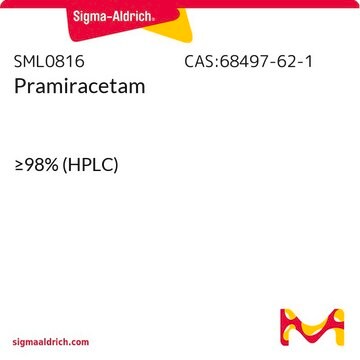S3378
Spironolactone
97.0-103.0% (HPLC), powder, aldosterone receptor antagonist
Synonym(s):
4-Pregnen-21-oic acid-17α-ol-3-one-7α-thiol γ-lactone 7-acetate, 7α-(Acetylthio)-17α-hydroxy-3-oxopregn-4-ene-21-carboxylic acid γ-lactone
About This Item
Recommended Products
product name
Spironolactone, 97.0-103.0%
Assay
97.0-103.0%
mp
207-208 °C (lit.)
solubility
chloroform: complete 50 mg/ml, clear, faintly yellow
SMILES string
CC(=O)S[C@@H]1CC2=CC(=O)CC[C@]2(C)[C@H]3CC[C@@]4(C)[C@@H](CC[C@@]45CCC(=O)O5)[C@H]13
InChI
1S/C24H32O4S/c1-14(25)29-19-13-15-12-16(26)4-8-22(15,2)17-5-9-23(3)18(21(17)19)6-10-24(23)11-7-20(27)28-24/h12,17-19,21H,4-11,13H2,1-3H3/t17-,18-,19+,21+,22-,23-,24+/m0/s1
InChI key
LXMSZDCAJNLERA-ZHYRCANASA-N
Gene Information
human ... HSD17B1(3292) , NR3C2(4306)
rat ... Ar(24208)
Looking for similar products? Visit Product Comparison Guide
Application
Biochem/physiol Actions
Features and Benefits
Preparation Note
Signal Word
Danger
Hazard Statements
Precautionary Statements
Hazard Classifications
Carc. 2 - Repr. 1B - STOT RE 2
Storage Class Code
6.1C - Combustible acute toxic Cat.3 / toxic compounds or compounds which causing chronic effects
WGK
WGK 3
Flash Point(F)
Not applicable
Flash Point(C)
Not applicable
Personal Protective Equipment
Certificates of Analysis (COA)
Search for Certificates of Analysis (COA) by entering the products Lot/Batch Number. Lot and Batch Numbers can be found on a product’s label following the words ‘Lot’ or ‘Batch’.
Already Own This Product?
Find documentation for the products that you have recently purchased in the Document Library.
Customers Also Viewed
Our team of scientists has experience in all areas of research including Life Science, Material Science, Chemical Synthesis, Chromatography, Analytical and many others.
Contact Technical Service














